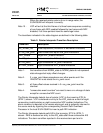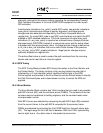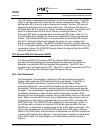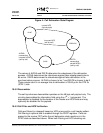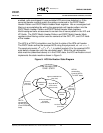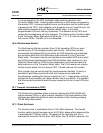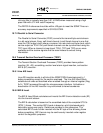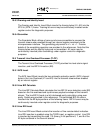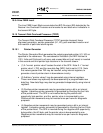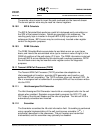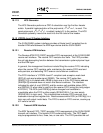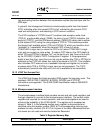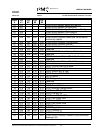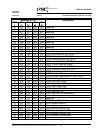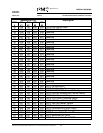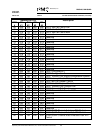
S/UNI-QUAD
PMC-Sierra, Inc.
PM5349 S/UNI-QUAD
DATASHEET
PMC-971239 ISSUE 6 SATURN USER NETWORK INTERFACE (155-QUAD)
Proprietary and Confidential to PMC-Sierra, Inc., and for its Customers’ Internal Use
49
10.9.4
Line FEBE Insert
The Line FEBE Insert Block accumulates line BIP-24 errors (B2) detected by the
Receive Line Overhead Processor and encodes far end block error indications in
the transmit M1 byte.
10.10
Transmit Path Overhead Processor (TPOP)
The Transmit Path Overhead Processor (TPOP) provides transport frame
alignment generation, pointer generation (H1, H2), path overhead insertion and
the insertion of path level alarm signals.
10.10.1
Pointer Generator
The Pointer Generator Block generates the outgoing payload pointer (H1, H2) as
specified in the references. The concatenation indication (the NDF field set to
1001, I-bits and D-bits set to all ones, and unused bits set to all zeros) is inserted
in the second and third pointer byte locations in the transmit stream.
•
(1) A "normal pointer value" locates the start of the SPE. Note: 0 ≤ "normal
pointer value" ≤ 782, and the new data flag (NDF) field is set to 0110. Note
that values greater than 782 may be inserted, using internal registers, to
generate a loss of pointer alarm in downstream circuitry.
•
(2) Arbitrary "pointer values" may be generated using internal registers.
These new values may optionally be accompanied by a programmable new
data flag. New data flags may also be generated independently using internal
registers.
•
(3) Positive pointer movements may be generated using a bit in an internal
register. A positive pointer movement is generated by inverting the five I-bits
of the pointer word. The SPE is not inserted during the positive stuff
opportunity byte position, and the pointer value is incremented by one.
Positive pointer movements may be inserted once per frame for diagnostic
purposes.
•
(4) Negative pointer movements may be generated using a bit in an internal
register. A negative pointer movement is generated by inverting the five D-bits
of the pointer word. The SPE is inserted during the negative stuff opportunity
byte position, the H3 byte, and the pointer value is decremented by one.
Negative pointer movements may be inserted once per frame for diagnostic
purposes.



